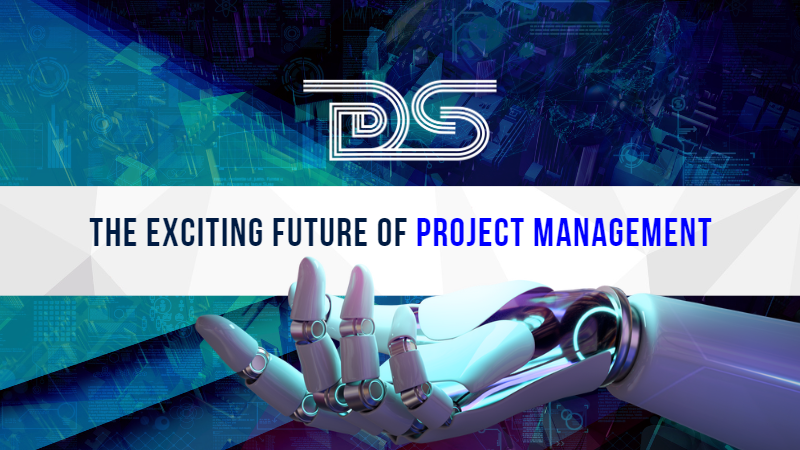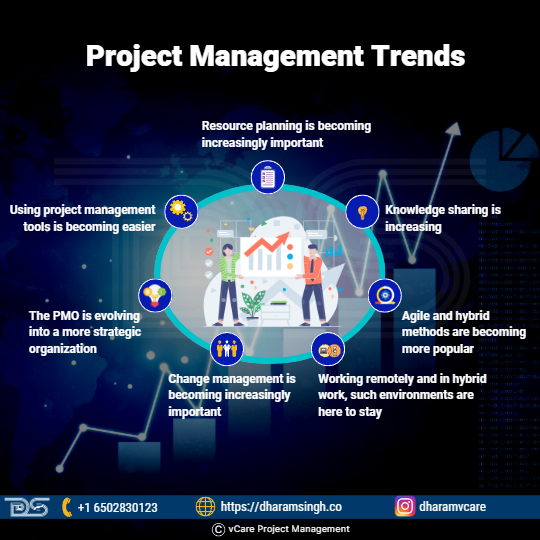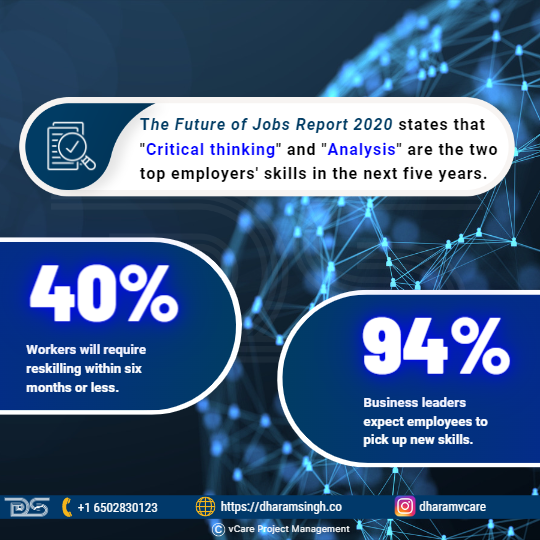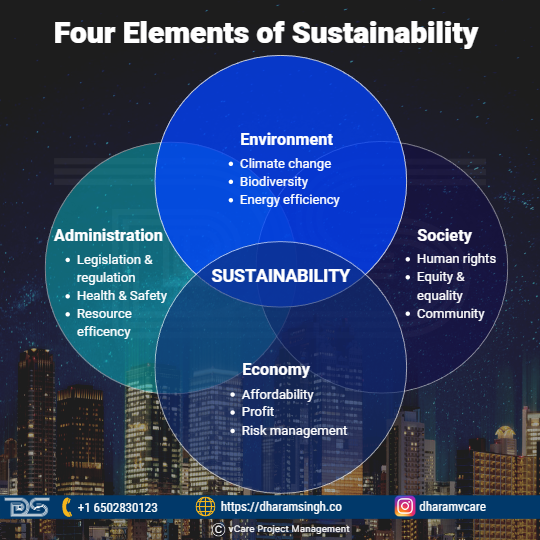
The Exciting Future of Project Management
Project management “is the application of tools, knowledge, processes, and competencies to ensure the successful completion of a project.” Projects are time-bound endeavors that seek to generate value through products, services, or outcomes that meet the project’s objectives and success parameters.
Project Management Institute (PMI) defines project management as “the use of specific knowledge, skills, tools, and techniques to deliver something of value to people.”
Project management is leading a team’s work to achieve all project goals within the constraints set. The primary rules are scope, time, and budget. The secondary task is to optimize the allocation of required inputs and apply them to achieve predefined goals.
Project managers are essential to a project’s success and are in high demand. They employ various skills and knowledge to engage and motivate others to achieve the project’s objectives. By 2027, employers will need 87.7 million individuals in project management-oriented roles as per the “Job Growth & Talent Gap 2017-2027” report.
“The Future of Project Management By Harold Kerzner, Ph.D., and J. LeRoy Ward International Institute for Learning (IIL)” article discusses four new principles to determine what types of project management training we believe are available to project managers in most of today’s successful business models.

Four Principles of Project Management Training
- First and most importantly, project management is now viewed as a business process in which project managers are expected to make business and project-related decisions.
- Second, project management is no longer viewed as a collection of operational or tactical activities to produce a deliverable or outcome.
- Third, project management is now a delivery system for achieving the desired business benefits and value.
- Fourth, project management is no longer just another career option within a company.
As more and more digitization is growing, project management has never been as exciting as it is now. The overall trend is an increase in the need for project managers. Project management is no more a job that deals with Gantt charts and ticking off a checklist.
Project management has always been a great profession to be in. It allows one to work with people, deal with risks and conflicts, and the ability to manage the outcomes for the business. It always gives you a feeling of importance and provides the opportunity to take leadership to drive the business goals. It greatly enhances your soft skills and helps you work with people to improve their capabilities along the project.
Apart from this, a project management profession helps you develop yourself and constantly provides new challenges every day. As the business grows dynamically, newer challenges and opportunities are managed by the project managers of today’s times. It provides career progression in terms of becoming a project manager, program manager, portfolio manager, and so on.
Project Management Trends
The project management industry rapidly evolves with the latest trends, tools, and technologies as the changes in trends in project management are dynamic and unavoidable. Therefore, understanding current project management trends will help us stay on top of the profession or business.

Project Management Trends
Trend 1: Resource planning is becoming increasingly important.
Trend 2: Knowledge sharing is increasing.
Trend 3: Agile and hybrid methods are becoming more popular.
Trend 4: Working remotely and in hybrid work, such environments are here to stay.
Trend 5: Change management is becoming increasingly important.
Trend 6: The PMO is evolving into a more strategic organization.
Trend 7: Using project management tools is becoming easier.
In a post-pandemic world, employing top project managers is more important than ever. Remote working, upskilling, and the pandemic’s lingering effects will shape the future of project management.
Increasing Emphasis on Soft Skills
Traditionally, the value of project managers was determined by their certifications and ability to implement various methodologies. However, many organizations are shifting their emphasis to soft skills. This project management trend is understandable, as AI-powered solutions have advanced to the point where they can handle the more challenging technical aspects of project management.

The Future of Jobs Report 2020
The Future of Jobs Report 2020 states that “Critical thinking” and “Analysis” are the two top employers’ skills in the next five years. 40% of workers will require reskilling within six months or less. 94% of business leaders expect employees to pick up new skills.
Project managers must now focus on improving their soft skills in conflict resolution, stakeholder engagement, negotiation, mentoring and training, decision-making, and team building. Practicing these skills will enable project managers to add more value to their organization.
Predictions for the Future of Project Management
“Change is the only constant,” as the adage goes. Project teams are no longer smaller, and the projects are no longer more straightforward. It appears to be true in the project management industry. The project management landscape is rapidly changing with evolving technologies, tools, and the latest trends.
Unlike the olden days now, there are a lot of tools, techniques, and methods that project managers can adopt to make the job much easier and more effective. Three major factors that would impact are:
- The Dynamically changing technology landscape.
- Increasing organizational complexity with Remote & Hybrid Work.
- Sustainability/Ecological concerns.

Factors Impacting Future of Project Management
1. The Dynamically changing Technology landscape
We will look at how the future of project management is evolving and exciting as the future holds concerning some of the changing technology components which are emerging.
a.) The growth of Artificial Intelligence (AI) and Automation
According to the Project Management Institute, 81 percent of professionals believe that AI impacts their organizations. Project managers are given a chance to focus their efforts and energy on tasks that will most significantly benefit their businesses. Automation can help project managers to effect more significant change and increase the chances of each project achieving its strategic goals.
By 2030, AI will have taken over 80 percent of the work of today’s PM discipline, including data collection, tracking, and reporting (Gartner, 2019).
PMI’s Pulse of the Profession report emphasizes the importance of data science skills, an innovative mindset, security and privacy knowledge, legal and regulatory compliance knowledge, the ability to make data-driven decisions, and collaborative leadership skills.
According to PwC’s ’22nd Annual Global CEO Survey, in the next five years, 85 percent of CEOs believe AI will significantly change how they do business. Even though it is still in its early stages of development, AI can be used in project management to reduce highly complex issues and play a significant role in their success.
In recent years, organizations have adopted AI on a larger scale to ensure successful project completion in a variety of ways, including:
- Producing performance insights
- Assisting in decision-making processes
- Estimating and forecasting
- Optimizing resource allocation
- Making data visualization possible
- Conducting risk analysis
AI with chatbots can even be integrated for project management reports and status on tasks. Also, the status can be updated from anywhere and anytime. It can help as an intelligent project assistant. Already products like PPM Express are working in this space. In construction and engineering space, AI can be used for monitoring sites and site inspection with the help of OpenCV, Drone cameras, etc. Large enterprises are using AI for intelligent resource deployments for projects.
b.) Rise in Data Analytics Focus for Data-Driven Project Management
Every day, organizations of all sizes generate massive amounts of data as it is only logical to use that data to notify decisions. Data analytics and reporting can assist project managers in identifying early signs of scope creep, calculating project progress rates, and other tasks.
AI-powered analytics provide a comprehensive picture of the entire organization and all projects. They provide granular visibility into activities and generate custom reports to assist project managers in visualizing data as required. With these tools, project managers can make informed decisions in real time rather than making gut-based decisions based on manually compiled reports.
c.) Advanced Project and Resource Management Tools
According to a 2020 report from Wellingtone, 54 percent of organizations lack access to real-time KPIs for their projects, and more than a third spend more than a day collecting data. This result demonstrates that project management tools can no longer be overlooked. When combined with AI-based automation capabilities, project management software can positively change how organizations manage their projects, regardless of their complexity.
Project managers of the future cannot survive without digital skills. The learning and experience on these tools will help appropriately present data and enhance decision-making with stakeholders. Current project management tools have become digital. Collaboration is seamless. For making effective decision making, the project managers need to have a good hold on the areas like the following:
- Data analysis, analytics, and management
- Security and data protection
- Legal and regulatory compliance
- Online collaboration and leadership (JIRA, Confluence, etc.,)
- Knowledge management (Sharepoint, Google Docs, etc., )
- Data-driven decision making. (BI Tools – Power BI, Tableau, etc.,)
Here are some examples of how the appropriate software can make a significant difference in future project management:
- Use historical project data to improve bids and plans for future projects.
- View resource availability, skills, and other details to make resource allocation easier.
- AI can automatically track all time spent on tasks and projects.
- To stay on top of finances, quickly allocate and track budgets.
- In real-time, capture all expenses with invoices for all projects.
- Track all projects using customizable dashboards to make better quick decisions.
- Maintain real-time communication with all stakeholders and team members about the project’s status, progress, and changes.
d.) Internet of Things:
The Internet of things is a network of electronic sensors and actuators that can help interact with each other and exchange data for numerical applications. We already see its application in the form of Alexa, Digital watches, Smart Vending Machines, and many more. The Internet of things can provide useful real-time data and help in various ways in project management. Assuming you are working on a team or sensitive project with technical and regulatory characteristics that need real-time data with a higher speed of reporting. IoT can help improve process control and also manage the explosion of valuable data on the project from sensors and devices. Project Managers can use these IoT technologies to reduce the workload in collecting data and streamline the reporting efforts.
e.) Digital Twins:
The Internet of things has been evolving, and it has been contributing to a lot of industries in terms of monitoring, real-time analytics, etc.; Projects involving Infrastructure, Construction, and industries would need a lot of physical presence. Digital twins can work with CAD and BIM (Building Information Modeling) data sets. Projects executed on these domains also call for ensuring the safety of the stakeholders involved in the project. In such scenarios, a digital twin can provide digital replicas of the physical objects or the location, which can encompass the project’s design and engineering aspects, which should help minimize travel/physical presence at the engineering sites. This action would also greatly enhance the better visibility of the sites in digital means for faster and more responsive actions on the project, yet contributing to sustainability via fewer carbon footprints. Digital twins provide intuitive visuals of the project situation with context and help to make decisions faster.
2. Increasing organization complexity with Remote & Hybrid Work
Remote working was already popular, but it has skyrocketed to unprecedented levels in recent years. While the global pandemic forced organizations to allow employees to telecommute due to safety concerns, remote work tends to continue for the foreseeable future. This aspect presents some intriguing challenges to project managers. According to Forbes, up to 97 percent of employees are unwilling to return to their offices full-time.
There have been renewed efforts in the post-pandemic era that many organizations have begun to experiment with a hybrid approach that combines elements from two or more methodologies. It is no longer just about agile, scrum, or lean but about combining specific attributes for increased flexibility in driving project success. This approach has enabled organizations to develop distinctive approaches to particular industries and projects.
The hybrid concept extends to the development of project team structures. The Capterra report states that 37% of teams are cross-functional and led by a dedicated PM. Cross-functional teams can share their department’s best practices for the project team to decide whether they want to incorporate them into their processes.
Hybrid project management is evolving. Projects are complex with a mix of technology, domain, people, process, and tools. Many organizations are not even ready for such a change to adapt themselves. Based on recent research by IPMA(International Project Management Association), only 47% of organizations are using agile approaches. Situations like the COVID-19 Ukraine-Russia conflict are making the environment more uncertain. Geopolitical situations can put countries and global projects at risk, increasing the challenges for project managers to be dynamic and responsive.
The project managers have to address problems like the following, which could be exciting and challenging:
a) More collaboration with contractors and suppliers
b) Higher staff turnover
c) Stakeholders having competing demands and expectations
d) Need for decisions taken faster
e) Increasing complexity in regulations and governance
Due to the inherent nature of dynamic technological changes, there is a need to manage constant training/coaching for the project members involved. This context keeps the project manager and project executives current and on the learning curve. In the future, project managers will be successful if they break the typical corporate mindset. They will be the ones who work with a hybrid approach and mindset. The term “hybrid” refers to the ability of the Project Manager to take an adaptive approach to the multiple roles and provide value with cross-functional/diverse teams.
Though technology plays a central role in project management, the project managers are expected to have great levels of emotional intelligence to manage the project members. The Project Manager needs to maneuver through social skills and empathy. This move would greatly contribute to the productivity and quality of the projects.
3. Sustainability / Ecological concerns
Project managers have to become socially responsible in alignment with the organizational culture, structure, and processes, starting with environmental analysis as per the PMBOK Guide. It would be exciting for the project managers to contribute to sustainability by adding the sustainability objectives to the project charter apart from the financial business case. This action might call for additional training on aspects like sustainability LCA(Life Cycle Assessments).
From sourcing to day-to-day operations in the project, the project manager needs to consider minimizing the carbon footprint, and it’s no more a thing specific to governments. Sustainability involves balancing different concerns:
- Environment, such as climate change
- Society, such as community
- Economy, such as affordability
- Administration, such as health and safety
When these four elements are considered, we can build sustainability into projects. (Reference: APM Body of knowledge 7th Edition)

Four Elements of Sustainability
Project managers need comprehensive risk management when it also calls for transparent project communication. Especially when it comes to a project with a high level of material handling, sustainability aspects in terms of procurement from the right suppliers, verification of the sources, material origin, quality of the material, etc., would come into context. Project managers must look from all the above perspectives to make sustainable project management a reality.
Conclusion
The project management profession has come into an exciting phase as it’s more challenging and has more tools to make it easier. Only with an appropriate level of training on the tools and adoption of emerging trends would project managers be able to sustain it. The project managers’ skills move in the direction of having focus, multi-skill leadership, emotional intelligence, change management, and negotiation skills. Achieving certifications would be to have an aspect to prove your credentials and have a structured approach to your thought process complementing your experience and skills in these areas outlined in this article.
Understanding current project management trends and predicting the future of project management is critical for staying on top of the profession. Considering the predictions, the future looks bright for those who can adapt to changing trends by expanding their knowledge of new tools and techniques and pursuing accreditation for project management in their specific industries.
Feel free to check out my discussion on this topic with Thomas Walenta in YouTube
You can subscribe and follow my podcasts and interviews with Project Management Experts on YouTube at https://bit.ly/2NDY8wd
You can subscribe to vCare Project Management YouTube Channel to catch future videos of our certification Q&A series and student success stories using the link https://bit.ly/2YF0wJl
For any questions related to Project Management career, training, and certifications, you can book an obligation free 15 minutes session with me by visiting talktodharam.com


Recent Comments